动词变名词、形容词
- 格式:docx
- 大小:16.15 KB
- 文档页数:3
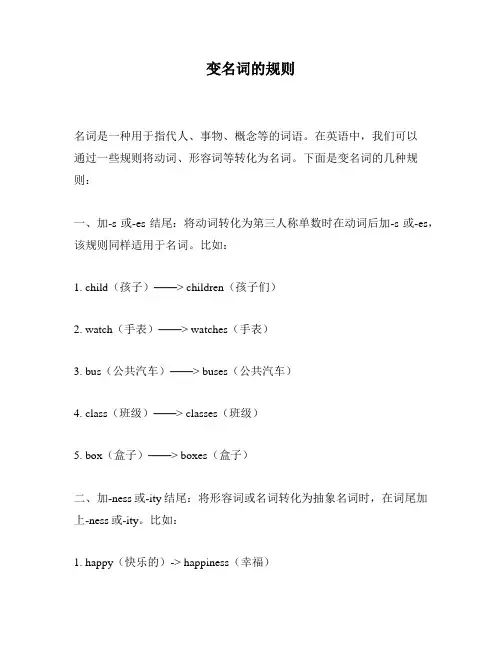
变名词的规则名词是一种用于指代人、事物、概念等的词语。
在英语中,我们可以通过一些规则将动词、形容词等转化为名词。
下面是变名词的几种规则:一、加-s或-es结尾:将动词转化为第三人称单数时在动词后加-s或-es,该规则同样适用于名词。
比如:1. child(孩子)——> children(孩子们)2. watch(手表)——> watches(手表)3. bus(公共汽车)——> buses(公共汽车)4. class(班级)——> classes(班级)5. box(盒子)——> boxes(盒子)二、加-ness或-ity结尾:将形容词或名词转化为抽象名词时,在词尾加上-ness或-ity。
比如:1. happy(快乐的)-> happiness(幸福)2. dark(黑暗的)-> darkness(黑暗)3. long(长的)-> length(长度)4. able(有能力的)-> ability(能力)5. active(活跃的)-> activity(活动)6. brave(勇敢的)-> bravery(勇气)三、加-ment或-ion结尾:将动词或形容词转化为抽象名词时,在词尾加上-ment或-ion。
比如:1. develop(发展)-> development(发展)2. entertain(娱乐)-> entertainment(娱乐)3. govern(治理)-> government(政府)4. inform(通知)-> information(信息)5. imagine(想象)-> imagination(想象力)四、加-er或-or结尾:将动词或名词转化为表示人或物的名词时,在词尾加上-er或-or。
比如:1. teach(教)-> teacher(教师)2. write(写)-> writer(作家)3. act(表演)-> actor(演员)4. invent(发明)-> inventor(发明家)5. defend(防御)-> defender(防守者)五、加-ism结尾:将名词转化为抽象名词时,在词尾加上-ism。
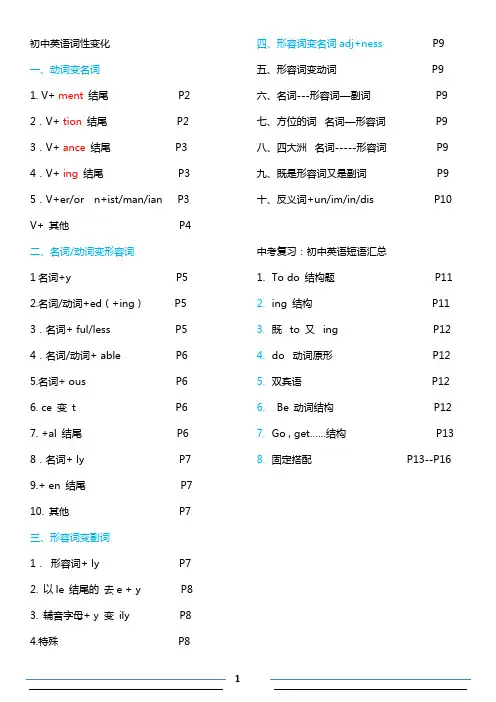
初中英语词性变化一、动词变名词1. V+ ment结尾P2 2.V+ tion 结尾P2 3.V+ ance结尾P3 4.V+ ing结尾P3 5.V+er/or n+ist/man/ian P3 V+ 其他P4 二、名词/动词变形容词1名词+y P5 2.名词/动词+ed(+ing)P5 3.名词+ ful/less P5 4.名词/动词+ able P65.名词+ ous P66. ce 变t P67. +al 结尾P6 8.名词+ ly P79.+ en 结尾P710. 其他P7三、形容词变副词1.形容词+ ly P72. 以le 结尾的去e + y P83. 辅音字母+ y 变ily P84.特殊P8 四、形容词变名词adj+ness P9五、形容词变动词P9六、名词---形容词—副词P9七、方位的词名词—形容词P9八、四大洲名词-----形容词P9九、既是形容词又是副词P9十、反义词+un/im/in/dis P10中考复习:初中英语短语汇总1.To do 结构题P112.ing 结构P113.既to 又ing P124.do 动词原形P125.双宾语P126.Be 动词结构P127.Go , get……结构P138.固定搭配P13--P16初中英语词性变化一、动词变名词1.v+ ment结尾achieve --- achieve ment成就advertise --- advertise ment 广告agree --- agree ment同意apart---apart ment公寓amuse---amuse ment 娱乐argu e --- argu ment争吵commit --- commit ment奉献compl y---compli ment称赞,恭维develop--develop ment发展disagree --- disagree ment不赞同depart---depart ment局,部excite---excite ment兴奋,激动expert专家---experi ment实验,试验equip 装备--- equip ment装备,器材govern 统治--- govern ment政府improve—improve ment改进---self-improve ment自我改善manage---manage ment 经营管理punish惩罚---punish ment惩罚2.V+ tion 结尾attract --- attract ion吸引collect—collect ion收集,收藏invent--- invent or / invent ion发明instruct --- instruct ion指导,介绍predict ---predict ion预言suggest ---suggest ion建议,暗示celebrat e—celebrat ion庆祝communicat e---communicat ion交流,沟通educat e --- educat ion教育educat or—education al--educational ist graduat e --- graduat ion毕业operat e - operat ion操作,动手术opera戏剧introduc e ---introduc tion介绍illustrat e --- illustrat ion阐明,举例说明pollut e --- pollut ion污染translat e—translat ion翻译,译文translat or compet e --- compet ition竞争,比赛produc e—produc t—product ion生产,产品organiz e—organiz ation—organize r—organ ize d有组织的imagin e --- imagin ation想象力invit e --- invit ation邀请inspir e---inspir ation灵感,鼓舞人心的prepar e---prepar ation准备discuss --- discuss ion讨论express ----express ion词语;表达impress --- impress ion印象conclu de --- conclu sion结论deci de --- deci sion决定resol ve --- resol ution决心sol ve ---sol ution解决方法admi t --- admi ssion承认permi t --- permi ssion允许descri be --- descri ption描写,描绘pron ou nc e ---pron u nc iation3.V+ ance 结尾allow --- allow ance允许appear--appear ance外貌,出现dis appear perform--perform ance演出perform er exist --- exist ance存在4.V+ ing 结尾bath e洗澡---bath ingend 结束--- end ing结尾,结局train 训练,火车---train ing训练mean ---- mean ing意义say--- say ing谚语remind --- remind ing提醒5.V+er结尾(…人)bank—bank er银行家blend混合v—blend er搅拌机clean---clean er清洁工cook烹饪,n厨师—cook er厨具,炊具draw画—draw er抽屉-draw ing绘画n dress连衣裙,穿衣—dress er梳妆台employ-employ er雇主,老板-employ ee雇员engine---engine er工程师garden花园v栽培花木---garden er园艺工farm农场v耕作---farm er农民fight---fight er战士foreign—foreign er外国人interview采访—interview er面谈者labor---labor er劳动者learn---learn er学习者/初学者murder---murder er杀人犯own---own er主人paint—paint er画家—paint ing油画play---play er选手,运动员perform—perform er—perform ance表演n print---print er印刷工read---read er读者report—report er记者research---research er研究员sell—sell er售货员sing---sing er歌唱家ski--ski er滑雪者speak—speak er演讲者,喇叭teach---teach er教师think---think er思想家travel---travel er旅游者wait—wait er服务员—wait ress女服务员wash—wash er洗衣机work---work er工人dance---dance r舞蹈家zoo-keep---zoo-keep er动物园饲养员drive---drive r司机explore---explore r探险家lose丢失—lose r失败者—los t迷失love---love r爱好者manage---manage r经理observe---observe r观测者/观察员office—office r警官,官员organiz e—organize r—organize d有组织的organiz ation组织,机构strange—strange r陌生人typewrite—typewrite r打字机village—village r村民wrestle---wrestle r摔交者write---write r作家begin---begin ner初学者/新手run---run ner跑步者/信使swim---swim mer游泳者win—win ner胜利者pass a ge---pass e nge r旅客laugh—laugh ter笑声soldi er士兵geography--geograph er地理学家6. V+or结尾(…人)act---act or男演员auth or作家collect---collect or收藏家conduct---conduct or列车员doct or医生edit---edit or编辑invent---invent or发明家profess---profess or教授sail---sail or水手translate---translat or翻译家visit—visit or参观者,游客三、以-ist结尾。
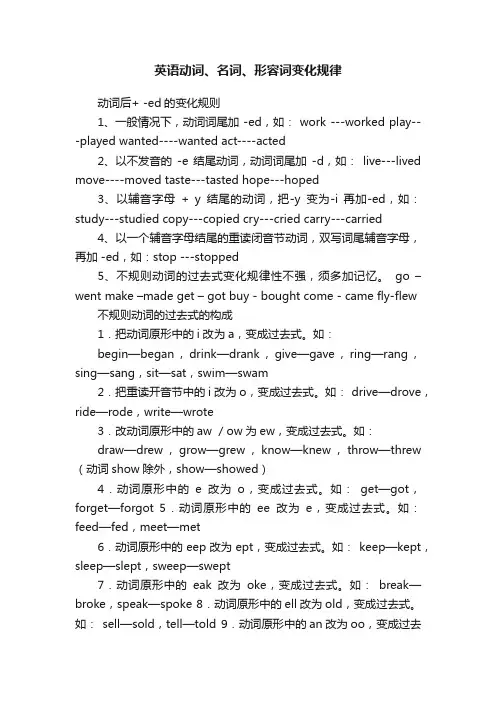
英语动词、名词、形容词变化规律动词后+ -ed的变化规则1、一般情况下,动词词尾加 -ed,如: work ---worked play---played wanted----wanted act----acted2、以不发音的-e 结尾动词,动词词尾加-d,如:live---lived move----moved taste---tasted hope---hoped3、以辅音字母+ y结尾的动词,把-y变为-i 再加-ed,如:study---studied copy---copied cry---cried carry---carried4、以一个辅音字母结尾的重读闭音节动词,双写词尾辅音字母,再加 -ed,如:stop ---stopped5、不规则动词的过去式变化规律性不强,须多加记忆。
go –went make –made get – got buy - bought come - came fly-flew 不规则动词的过去式的构成1.把动词原形中的i改为a,变成过去式。
如:begin—began,drink—drank,give—gave,ring—rang,sing—sang,sit—sat,swim—swam2.把重读开音节中的i改为o,变成过去式。
如: drive—drove,ride—rode,write—wrote3.改动词原形中的aw /ow为ew,变成过去式。
如:draw—drew,grow—grew,know—knew,throw—threw (动词show除外,show—showed)4.动词原形中的e改为o,变成过去式。
如:get—got,forget—forgot 5.动词原形中的ee改为e,变成过去式。
如:feed—fed,meet—met6.动词原形中的eep改为ept,变成过去式。
如:keep—kept,sleep—slept,sweep—swept7.动词原形中的eak改为oke,变成过去式。

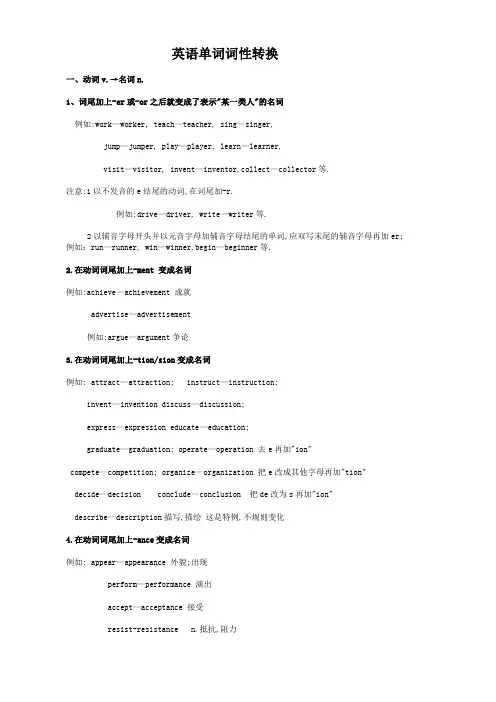
英语单词词性转换一、动词v.→名词n.1、词尾加上-er或-or之后就变成了表示"某一类人"的名词例如:work—worker, teach—teacher, sing—singer,jump—jumper, play—player, learn—learner,visit—visitor, invent—inventor,collect—collector等.注意:1以不发音的e结尾的动词,在词尾加-r.例如:drive—driver, write—writer等.2以辅音字母开头并以元音字母加辅音字母结尾的单词,应双写末尾的辅音字母再加er; 例如:run—runner, win—winner,begin—beginner等.2.在动词词尾加上-ment 变成名词例如:achieve—achievement 成就advertise—advertisement例如:argue—argument争论3.在动词词尾加上-tion/sion变成名词例如: attract—attraction; instruct—instruction;invent—invention discuss—discussion;express—expression educate—education;graduate—graduation; operate—operation 去e再加"ion"compete—competition; organize—organization 把e改成其他字母再加"tion"decide—decision conclude—conclusion 把de改为s再加"ion"describe—description描写,描绘这是特例,不规则变化4.在动词词尾加上-ance变成名词例如: appear—appearance 外貌;出现perform—performance 演出accept—acceptance 接受resist-resistance n.抵抗,阻力5.在动词词尾加-ing变成名词方法与动词变为现在分词的方法相同例如:meet—meeting build—building wait—waitingbathe—bathing say—saying谚语 mean—meaning注意:以辅音字母开头并以元音字母加辅音字母结尾的单词,应双写末尾的辅音字母再加-ing 如:swim—swimming shop—shopping begin—beginning二、动词v.→形容词adj.1.动词后面加able,以e结尾的动词则去e加able,表示具有此性质,特点或属性.例如: afford-affordable;love-lovable2.动词后面加ed,以e结尾的动词则直接加d,表示被动性的属性或特点.例如: scatter-scattered use-used3不规则的动词则必须记忆,记住其过去分词形式.规律不大,意义同b.三.名词n.→形容词adj.1.在名词后面加-y可以变成形容词尤其是一些与天气有关的名词例如: rain—rainy, cloud—cloudy, wind—windy, snow—snowy,health—healthy, luck—lucky,anger—angry guilt—guilty内疚的tourist—touristy游客多的 , salt 盐—salty 咸的silk丝绸—silky丝绸般的, sleep—sleepy 昏昏欲睡的注意:1如果以辅音字母开头并以元音字母加辅音字母结尾,这时应双写辅音字母再加"-y".如: sun—sunny, fun—funny, fog—foggy有雾的, fur—furry毛皮的2少数以不发音的e结尾的名词变为形容词时,应去掉e再加"-y".如: noise—noisy, ice—icy, shine—shiny发亮的, taste口味—tasty甜的2.名词后面加-ed,以e结尾的直接加d.例如: spot斑点—spotted有斑点的; talent—talented 有天赋的organize—organized 有组织的; balance—balanced平衡的3.一些抽象名词在词尾加-ful可以变为形容词例如:care—careful, thank—thankful, help—helpful,use—useful, meaning—meaningful4.在名词后加-less构成含有否定意义的形容词例如:care—careless粗心的, use—useless无用的hope—hopeless没希望的,home—homeless无家可归的5.一些以-ce结尾的名词,把-ce改为-t变成形容词例如: difference—different, silence—silent, confidence—confident 6.在名词后加-ly变为形容词例如: friend—friendly, love—lovely, live---lively7.在名词后加-ous变为形容词例如: danger—dangerous prosperous a 繁荣的pro 在前+sper 希望+ous 8.名词后面加-al变为形容词例如: music—musical; medicine—medical 这个比较特殊9名词后面加-able变为形容词,如果以e结尾就去e再加"-able".例如: adjust—adjustable 可调整的 value—valuable有价值的10.名词后面加-en变成形容词例如: wood—wooden 木制的 wool—woolen 羊毛的四.形容词adj.→副词adv.▲一般在形容词的词尾加-ly可以变成副词例如: quick—quickly, slow—slowly, loud—loudly, sudden—suddenly 等例如:possible—possibly, terrible—terribly。
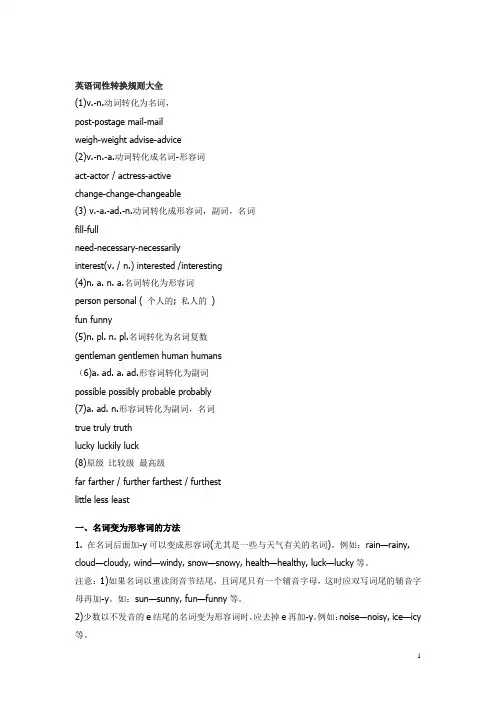
英语词性转换规则大全(1)v.-n.动词转化为名词,post-postage mail-mailweigh-weight advise-advice(2)v.-n.-a.动词转化成名词-形容词act-actor / actress-activechange-change-changeable(3) v.-a.-ad.-n.动词转化成形容词,副词,名词fill-fullneed-necessary-necessarilyinterest(v. / n.) interested /interesting(4)n. a. n. a.名词转化为形容词person personal ( 个人的; 私人的)fun funny(5)n. pl. n. pl.名词转化为名词复数gentleman gentlemen human humans(6)a. ad. a. ad.形容词转化为副词possible possibly probable probably(7)a. ad. n.形容词转化为副词,名词true truly truthlucky luckily luck(8)原级比较级最高级far farther / further farthest / furthestlittle less least一、名词变为形容词的方法1. 在名词后面加-y可以变成形容词(尤其是一些与天气有关的名词)。
例如:rain—rainy, cloud—cloudy, wind—windy, snow—snowy, health—healthy, luck—lucky等。
注意:1)如果名词以重读闭音节结尾,且词尾只有一个辅音字母,这时应双写词尾的辅音字母再加-y。
如:sun—sunny, fun—funny等。
2)少数以不发音的e结尾的名词变为形容词时,应去掉e再加-y。
例如:noise—noisy, ice—icy 等。
2. 一些抽象名词在词尾加-ful可以变为形容词。
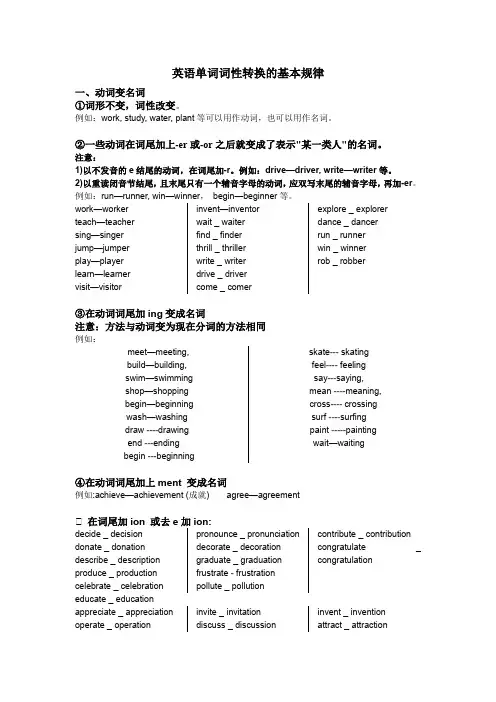
英语单词词性转换的基本规律一、动词变名词①词形不变,词性改变。
例如:work, study, water, plant等可以用作动词,也可以用作名词。
②一些动词在词尾加上-er或-or之后就变成了表示"某一类人"的名词。
注意:1)以不发音的e结尾的动词,在词尾加-r。
例如:drive—driver, write—writer等。
2)以重读闭音节结尾,且末尾只有一个辅音字母的动词,应双写末尾的辅音字母,再加-er。
例如:run—runner, win—winner,begin—beginner等。
work—worker teach—teacher sing—singer jump—jumper play—player learn—learner visit—visitor invent—inventorwait _ waiterfind _ finderthrill _ thrillerwrite _ writerdrive _ drivercome _ comerexplore _ explorerdance _ dancerrun _ runnerwin _ winnerrob _ robber③在动词词尾加ing变成名词注意:方法与动词变为现在分词的方法相同例如:meet—meeting, build—building, swim—swimming shop—shopping begin—beginning wash—washing draw ----drawing end ---ending begin ---beginning skate--- skating feel---- feeling say---saying, mean ----meaning, cross---- crossing surf ----surfing paint -----painting wait—waiting④在动词词尾加上ment 变成名词例如:achieve—achievement (成就) agree—agreement ⑤在词尾加ion 或去e加ion:decide _ decision donate _ donation describe _ description produce _ production celebrate _ celebration pronounce _ pronunciationdecorate _ decorationgraduate _ graduationfrustrate - frustrationpollute _ pollutioncontribute _ contributioncongratulate _congratulationeducate _ educationappreciate _ appreciation operate _ operation invite _ invitationdiscuss _ discussioninvent _ inventionattract _ attraction⑥其他一些比较特殊的变化know ---- knowledge please ---pleasure enjoy--- enjoyment practise--- practice die ---death succeed--- success weigh ---weight sit-- seatchange --chance enter --entrancefly --flightdiscover-- discovery appear-- appearance breathe-- breath二、名词变形容词①在名词后面加-y可以变成形容词(尤其是一些与天气有关的名词)例如: rain—rainy, cloud—cloudy, salt —salty sleep—sleepy注意:1)如果以重读闭音节结尾,且词尾只有一个辅音字母,这时应双写辅音字母再加"-y".如: sun—sunny, fun—funny, fog—foggy2)少数以不发音的e结尾的名词变为形容词时,应去掉e再加"-y".如: noise—noisy, ice—icy②名词后面加-ed,以e结尾的直接加d,表示被动性的属性或特点.talent—talented (有天赋的) use-usedplease - pleasedunite - unitedexcite - excitedclose - closedrelax - relaxed surprise - surprised, develop - developed interest - interested crowd - crowded pollute - polluted③一些抽象名词在词尾加-ful可以变为形容词use - useful care - careful, help - helpful, thank - thankful peace - peaceful, forget - forgetful, play - playful, succeed - successful, wonder - wonderful④在名词后加-less构成含有否定意义的形容词例如:care—careless, use—uselesshope—hopeless,home—homeless⑤一些以-ce结尾的名词,把-ce改为-t变成形容词例如: difference—different, silence—silent, confidence—confident ⑥在名词后加-ly变为形容词例如: friend—friendly, love—lovely, live---lively⑦在名词后加-ous变为形容词例如: danger—dangerous humor—humorous⑧名词后面加-al变为形容词例如: music—musical; medicine—medical (这个比较特殊) educate - educational ⑨名词后面加-able变为形容词,如果以e结尾就去e再加"-able".例如: adjust—adjustable 可调整的value—valuable有价值的know - knowledgeable, enjoy - enjoyabe, suit - suitableadjust - adjustable, comfort - comfortable⑩名词后面加-en变成形容词例如: wood—wooden 木制的wool—woolen 羊毛的speak - spoken, break - broken⑪一些表示国家的名词可以在词尾加-ese, -ish或-n构成表示国籍,语言的形容词例如:China—Chinese, England—English,America—American, Australia —Australian(注意Canada—Canadian)⑫其它:lose - lost,fool - foolish,live - lively / alive /living, sleep - sleepy / sleeping / asleep, wake - awake, taste - tastydie - dead,world - worldwide。
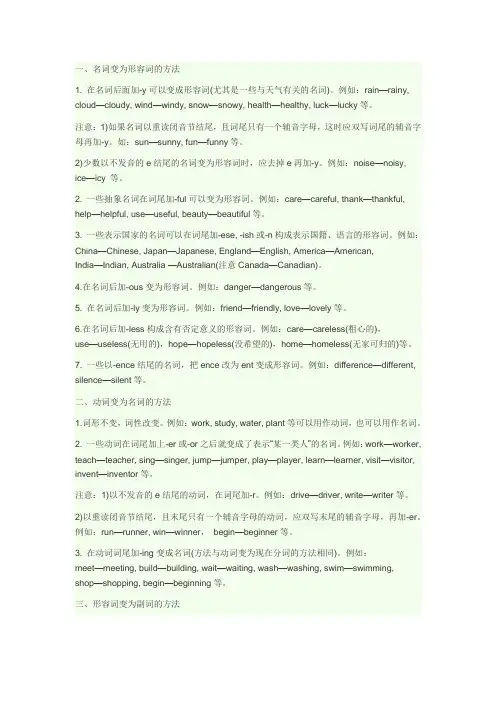
一、名词变为形容词的方法1. 在名词后面加-y可以变成形容词(尤其是一些与天气有关的名词)。
例如:rain—rainy, cloud—cloudy, wind—windy, snow—snowy, health—healthy, luck—lucky等。
注意:1)如果名词以重读闭音节结尾,且词尾只有一个辅音字母,这时应双写词尾的辅音字母再加-y。
如:sun—sunny, fun—funny等。
2)少数以不发音的e结尾的名词变为形容词时,应去掉e再加-y。
例如:noise—noisy, ice—icy 等。
2. 一些抽象名词在词尾加-ful可以变为形容词。
例如:care—careful, thank—thankful, help—helpful, use—useful, beauty—beautiful等。
3. 一些表示国家的名词可以在词尾加-ese, -ish或-n构成表示国籍、语言的形容词。
例如:China—Chinese, Japan—Japanese, England—English, America—American, India—Indian, Australia —Australian(注意Canada—Canadian)。
4.在名词后加-ous变为形容词。
例如:danger—dangerous等。
5. 在名词后加-ly变为形容词。
例如:friend—friendly, love—lovely等。
6.在名词后加-less构成含有否定意义的形容词。
例如:care—careless(粗心的),use—useless(无用的),hope—hopeless(没希望的),home—homeless(无家可归的)等。
7. 一些以-ence结尾的名词,把ence改为ent变成形容词。
例如:difference—different, silence—silent等。
二、动词变为名词的方法1.词形不变,词性改变。
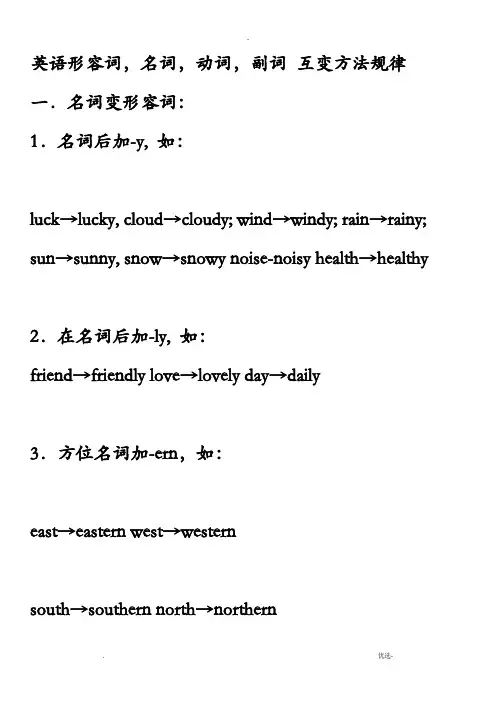
英语形容词,名词,动词,副词互变方法规律一.名词变形容词:1.名词后加-y, 如:luck→lucky, cloud→cloudy; wind→windy; rain→rainy; sun→sunny, snow→snowy noise-noisy health→healthy2.在名词后加-ly, 如:friend→friendly love→lovely day→daily3.方位名词加-ern,如:east→eastern west→westernsouth→southern north→northern二.动词变形容词1.词尾加ful:use - useful, care - careful, help - helpful, thank - thankful peace - peaceful,forget - forgetful, play - playful,succeed - successful, wonder - wonderful2.词尾加d或ed:please - pleased, unite - united, excite - excited,surprise - surprised, organize - organized, close - closed, wound - wounded, relax - relaxed,develop - developed, appreciate - appreciated,frustrate - frustrated, interest - interested, annoy - annoyed, use - used, frighten - frightened, crowd - crowded, thrill - thrilled, pollute - polluted3.词尾加ing:interest - interesting,surprise - surprising, excite - excitingdevelop - developing, frighten - frightening, thrill - thyrillingfrustrate - frustrating, relax _ relaxing,live - livingrock - rocking, sleep - sleeping4.词尾变y为i,加ed:worry - worried, marry - married,fry - fried, terrify - terrified satisfy - satisfied5.词尾加able:know - knowledgeable, enjoy - enjoyabe,suit - suitable,adjust - adjustable, comfort - comfortable6.其它:lose - lost, fool - foolish, live - livelysleep - sleepy / sleeping / asleep,wake - awake, taste - tastyspeak - spoken, break - broken, die - dead, educate - aducational,world - worldwide三.形容词变副词规律小结例词1.大部分形容词加lycareless----carelesslyquiet----quietlydifferent----differently2.以le结尾的形容词变le为ly-possible----possiblyterrible----terriblycomfortable----comfortablygentle----gentlysimple----simply3.以y结尾的形容词变y为ilyeasy----easilyangry----angrilynoisy----noisilyhappy----happilyheavy----heavilyhealthy----healthily不规则变化本身既是形容词也是副词,无需改变fast----fastearly----earlyhigh----highhard----hardlate----latefar----farwide----widealone----alone形容词和副词为完全不同的单词good----well需要去掉字母e的单词true----trulygentle----gentlyterrible----terribly虽然以ly结尾,但却是形容词,不能直接用来修饰动词friendlylivelylovelylonelyLikely有些形容词本身即为副词,同时也有加ly的副词形式。
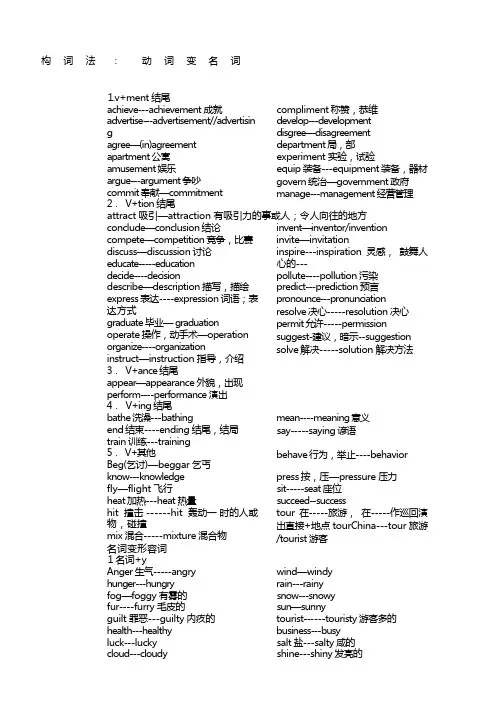
构 词 法 : 动 词 变 名 词1.v+ment 结尾achieve---achievement 成就 advertise---advertisement//advertisin g agree —(in)agreement apartment 公寓 amusement 娱乐 argue---argument 争吵 commit 奉献—commitment 2. V+tion 结尾compliment 称赞,恭维 develop---development disgree —disagreement department 局,部 experiment 实验,试验 equip 装备---equipment 装备,器材 govern 统治—government 政府 manage---management 经营管理 attract 吸引—attraction 有吸引力的事或人;令人向往的地方 conclude —conclusion 结论 compete —competition 竞争,比赛 discuss —discussion 讨论 educate-----education decide----decisiondescribe —description 描写,描绘express 表达----expression 词语;表 达方式 graduate 毕业— graduation operate 操作,动手术—operation organize----organization instruct —instruction 指导,介绍 3. V+ance 结尾 appear —appearance 外貌,出现perform----performance 演出4. V+ing 结尾bathe 洗澡---bathing end 结束----ending 结尾,结局 train 训练---training 5. V+其他 Beg(乞讨)—beggar 乞丐 know---knowledge fly —flight 飞行 heat 加热---heat 热量 hit 撞击 ------hit 轰动一 时的人或 物,碰撞 mix 混合-----mixture 混合物 名词变形容词 1 名词+yAnger 生气-----angry hunger---hungry fog —foggy 有雾的 fur----furry 毛皮的 guilt 罪恶---guilty 内疚的 health---healthy luck---lucky cloud---cloudy invent —inventor/invention invite —invitation inspire---inspiration 灵感, 鼓舞人 心的---pollute----pollution 污染 predict---prediction 预言 pronounce---pronunciation resolve 决心-----resolution 决心 permit 允许-----permission suggest-建议,暗示--suggestion solve 解决-----solution 解决方法mean----meaning 意义 say-----saying 谚语 behave 行为,举止----behavior press 按,压—pressure 压力 sit-----seat 座位 succeed--success tour 在-----旅游, 在-----作巡回演 出直接+地点 tourChina---tour 旅游 /tourist 游客 wind —windy rain---rainy snow---snowy sun —sunny tourist------touristy 游客多的 business---busy salt 盐---salty 咸的 shine---shiny 发亮的silk 丝绸—silky 丝绸般的sleep---sleepy 昏昏欲睡的2.名词+edbalance–balanced 平衡的spot 斑点,地点----spotted 有斑点的talent-----talented 有天赋的organized 有组织的3.名词+ful/less meaning—meaningful 有意义的care—careful/careless 小心的;粗心的help---helpful/helpless home—homeless 无家可归的colour---colourful4.名词+ableadjustable 可调整的comfort---comfortable5.名词+ousenormous 巨大的danger—dangerousmystery 神秘-----mysterious 神秘的7.al 结尾medicine 药----medical 医学的music---musicalnature---natural 自然的person---personal(私人的) nation—national 国家的8.名词+lyfriend—friendlylive---lively 活跃的,有生气的love—lovely 可爱的10.其他energy 精力---energeticfool 傻子—foolish 愚蠢的freedom 自由—free 空的,免费的height 高度—highillness 疾病---illlove—loving 慈爱的方位的词表达名词—形容词East—eastern West—western South—southern四大洲名词-----形容词Asia 亚洲–----AsianAfrica 非洲-----AfricanEurope 欧洲-----European America 美洲-----American形容词变副词1.形容词+lybad—badlybright—brightly 明亮地casual—casually 随意地taste 口味,品味------tasty 甜的distusted 厌恶的offended 生气的crowded 拥挤的polluted 被污染的pleased 高兴的pain 疼痛---painful 痛苦的use---useless/useful thank—thankful 充满感激的peace 和平----peaceful 平静的,宁静的playful 顽皮的,爱玩耍的knowledge---knowledgeablesuit 一套-----suitable 合适的6.ce 变 tconfidence----confident difference---differenteducation---educational 有教育意义的tradition----traditional 传统的origin 起源---original 新颖的;独创的9.+en 结尾wood—wooden 木制的wool—woolen 羊毛的death---deadpleasure---pleasant/pleased popularity 流行性—popular pride---proudscientist----scientific 科学的North---northern InthewestofChinaI nthewesternpartofChinaclear—clearly 清楚地complete—completely 完全correct---correctly 正确地final--finally fortunate—fortunately 幸运地general—generally 一般来讲loud—loudlyparticular 特殊的,独特的—particularlypolite—politelyproper 合适的-,恰当的 ---properly main------mainly 主要地most 多数-----mostly 多半,大多数normal---normally 正常地quick—quicklyquiet—quietly 轻轻地,安静地2.以 le 结尾的去 e+y comfortable---comfortably gentle—gentlypossible---possibly3.辅音字母+y 变 ily easy—easilyheavy—heavilyhappy--happily4.特殊good—well 好地 well 身体健康的,井true—truly名词---形容词—副词beauty 美,美人— beautiful —beautifully care—careful—carefully care—careless —carelessly difference---different---differently happiness —happy—happily hunger—hungry--hungrily health—healthy—healthily luck—lucky—luckily noise—noisy—noisily既是形容词又是副词earlygetupearly;anearlytrain latebelateforclassc omelateforschool deepdivedeepintotheseaaholedeeplarge highjumphigh;ahighmountain hardahardquestion;ahardstoneworkhard/studyhardrainhard longIttakestoolongIttakesalongtime farjumpfar Myhomeisfarfromschool straightastraightline gostraightalonghere real—reallyrecent 最近的----recently 最近;近来hard 难的;努力地---hardly 几乎不late 迟的—lately 最近;近来sad--sadlyslow---slowly special—specially 专门,特殊地specific---specifically 特定地,明确地strong—strongly 坚决地,强烈地sudden—suddenly 突然usual—usuallysimple----simply 仅仅;只;简单地terrible---terriblypride—proud—proudly 骄傲地sadness — sad—sadlysafety 安全;安全的地方— safe —safelysilence—silent---silently 默默地success —successful —successfully truth—true—truly unluck—unlucky—unluckily wonder 奇迹— wonderful —wonderfully。
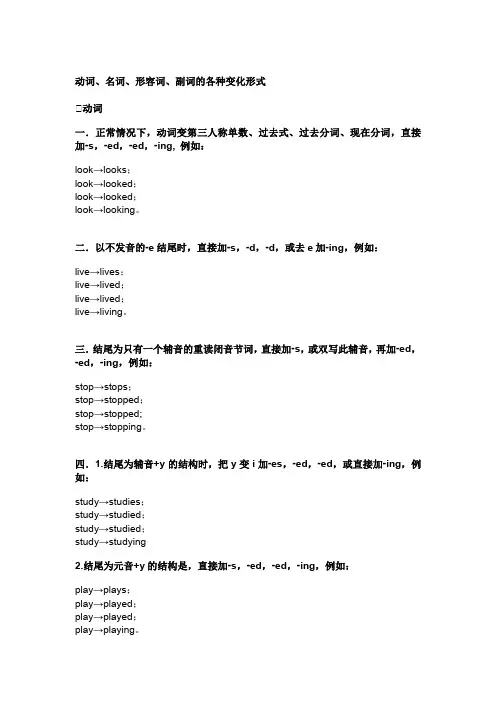
动词、名词、形容词、副词的各种变化形式★动词一.正常情况下,动词变第三人称单数、过去式、过去分词、现在分词,直接加-s,-ed,-ed,-ing, 例如:look→looks;look→looked;look→looked;look→looking。
二.以不发音的-e结尾时,直接加-s,-d,-d,或去e加-ing,例如:live→lives;live→lived;live→lived;live→living。
三.结尾为只有一个辅音的重读闭音节词,直接加-s,或双写此辅音,再加-ed,-ed,-ing,例如:stop→stops;stop→stopped;stop→stopped;stop→stopping。
四.1.结尾为辅音+y的结构时,把y变i加-es,-ed,-ed,或直接加-ing,例如:study→studies;study→studied;study→studied;study→studying2.结尾为元音+y的结构是,直接加-s,-ed,-ed,-ing,例如:play→plays;play→played;play→played;play→playing。
五.结尾为-ie,去ie变y+ing,例如:lie→lying;die→dying。
(另:lie,lies,lied,lied,lying说谎lie,lies,lay,lain,lying 躺,平放,位于lay,lays,laid,laid,laying 放置,产卵)六.以r音节结尾的词,直接加-s,双写r加-ed,-ed,-ing,例如:prefer→prefers;prefer→preferred;prefer→preferred;prefer→preferring。
(另:以s,x,ch,sh或o结尾的动词,变第三人称单数时,加-es,例如:misses,fixes,teaches,washes,goes。
动词be遇有主语是第一人称单数时,be改为am,遇有主语是第二人称时,be改为are,遇有主语是第三人称单数时,be改为is。
把动词的结尾改为【ed 】或【ing 】形式,就能变为形容词。
比如↓ I was really bored in that presentation. That was areally boring presentation. - ed -以【ed 】结尾的形容词通常描述【人们】的情绪。
I was so bored in that lesson, I almost fell asleep.He was surprised to see Helen after all those years.She was really tired and went tobed early. - ing -以【ing 】结尾的形容词通常描述引起人们情绪的【事物】。
Have you seen that film? It's really frightening.I could listen to her for hours. She's so interesting.I can't sleep! That noise is really annoying! - 对比 -有些动词,改为两种结尾都可以。
语法规则如常:【ed 】——【人们】的情绪。
【ing 】——引起情绪的【事物】。
以上区别其实很好理解。
一件【事物】让【人们】有了某些情绪,那么:【事物】是主动方,用【ing】结尾;【人们】是被动方,用【ed】结尾。
动词变名词1.v+ ment 结尾achieve ——achievement 成就advertise ——advertisement 广告agree ——agreement 同意amuse——amusement 娱乐commit ——commitment 奉献develop ——development 发展disagree ——disagreement 不赞同equip 装备——equipment 装备,器材govern 统治——government 政府manage——management 经营,管理argue ——argument 争吵2.V+ ion 结尾attract ——attraction 吸引discuss ——discussion 讨论express ——-expression 词语;表达instruct ——instruction 指导,介绍invent——invention 发明predict ——prediction 预言impress ——impression 印象suggest ——suggestion 建议,暗示educate ——education 教育graduate ——graduation 毕业operate ——operation 操作,动手术illustrate ——illustration 阐明,举例说明pollute ——pollution 污染introduce ——introduction 介绍organize ——organization组织imagine ——imagination 想象力inspire——inspiration 灵感,鼓舞人心的invite ——invitation 邀请compete ——competition 竞争,比赛pronounce ——pronunciation发音admit ——admission 承认permit ——permission 允许conclude ——conclusion 结论decide ——decision 决定describe ——description描写,描绘resolve ——resolution 决心solve ——solution 解决方法3.V+ ance 结尾allow ——allowance 允许appear ——appearance 外貌,出现perform ——performance 演出exist ——existance 存在4.V+ ing 结尾end ——ending 结尾,结局train ——training训练mean ——meaning 意义say——saying 谚语remind ——reminding提醒bathe ——bathing沐浴5.词尾加-er或-or后变成表示“某一类人”的名词work——worker 工人teach——teacher老师sing——singer 歌手jump——jumper跳高运动员play——player表演者、运动员learn——learner 学习者visit——visitor访问者invent——inventor发明家6.V+ 其他beg——beggar 乞丐sit——seat 座位believe ——belief 信仰behave ——behavior 行为know——knowledge 知识fly——flight 飞行mix ——mixture 混合物press ——pressure 压力serve ——service 服务succeed ——success 成功pursue ——pursuit 追求,从事propose ——proposal 建议withdraw ——withdrawal 取钱;收回;撤退survive ——survival--survivor 幸存者arrive ——arrival到达analyze ——analysis 分析2形容词变名词1.词尾ent改为ency或ence efficient有效率的——efficiency 效率patient——patience/impatience 耐性/无耐心dependent——dependence依赖性independent——independency 独立性urgent——urgency 紧急2.ble结尾,ble改为bility possible——possibility 可能responsible——responsibility 责任;职责3.其他accurate——accuracy 准确性prosperous——prosperity 繁荣true——truth 真相wide——width 宽度long——length 长度high——height 高度二、名词/动词变形容词1.名词+yhonest ——honesty 诚实的guilt 罪恶——guilty 内疚的health——healthy 健康的luck——lucky 幸运的cloud——cloudy 多云的wind—windy 多风的rain——rainy 多雨的snow——snowy 多雪的tourist ——touristy 游客多的er结尾,改er为ry hunger——hungry 饥饿的anger ——angry 生气的fog——foggy 有雾的sun——sunny 阳关灿烂的fur——furry 毛皮的shine——shiny 发亮的taste ——tasty 美味的2. 名词/动词+ ed以辅音+辅音结尾的单词,直接加ed talent ——talented 有天赋的offend ——offended 生气的crowd ——crowded 拥挤的以元音字母e结尾的单词直接加d balance ——balanced 平衡的organize——organized 有组织的pollute ——polluted 被污染的please ——pleased 高兴的元音加辅音结尾的单词,词尾辅音双写再加edspot ——spotted 有斑点的3.名词+ ful/lesscare ——careful/ careless 小心的/ 粗心的help——helpful / helpless 有帮助的/ 无助的use——useful/ useless有用的/ 无用的meaning ——meaningful / meaningless有意义的/无意义的colour——colourful /colourless 多彩的/无色的pain 疼痛——painful /painless痛苦的/ 不痛的thank——thankful / thankless 充满感激的/ 不知感恩的peace 和平——peaceful 和平的play游戏——playful 爱玩耍的home ——homeless 无家可归的4.名词/动词+ ablechange ——changeable 易变的adjust——adjustable 可调整的comfort——comfortable 舒适的knowledge——knowledgeable 知识渊博的suit ——suitable 合适的动词以辅音加y结尾把y变i 加able ,deny——deniable 可否认的rely——reliable 可靠的5.名词+ ous courage——courageous 勇敢的danger——dangerous 危险的以y结尾,改y为i再加ous mystery 神秘——mysterious 神秘的6.ce 变t confidence——confident 自信的difference——different 不同的dependence ——dependent 依赖他人的independence——independent 独立的7.词尾加al addition——additional 附加的,额外的music——musical 音乐的person——personal (私人的) nation——national 国家的education——educational有教育意义的tradition——traditional 传统的origin起源——original 新颖的;独创的以元音字母结尾的单词,去掉词尾元音加alnature——natural 自然的globe——global 全球的特例:class——classical 经典的medicine 药——medical 医学的grammar——grammatical 语法的8.名词+ ly friend——friendly 友好的live——lively 活跃的,有生气的love——lovely 可爱的week——weekly 每周的man——manly 男子气概的;强壮的9.词尾+ en wood——wooden 木制的wool——woolen 羊毛的10. 表示方位的词East——eastern West——western South——southern North——northern11.四大洲Asia 亚洲——AsianAfrica 非洲——African Europe欧洲——European America 美洲——American 12. 其他energy精力——energetic 精力充沛的strategy——strategic 战略的scientist——scientific 科学的fool 傻子——foolish 愚蠢的love——loving 慈爱的pleasure——pleasant令人愉快的/ pleased高兴的pride——proud 自豪的3形容词变动词1.词尾加ize modern——modernize 使...现代化social——socialize 使...社会化2.词尾加enfast——fasten 使固定;集中于short——shorten 缩短wide——widen 放宽less——lessen 使...减少特例(有变形):long——lengthen 使延长strong ——strengthen 加强;巩固3.词前加enlarge ——enlarge 扩大;放大4形容词变副词1.形容词+ ly bad——badly 坏地bright——brightly 明亮地casual——casually 随意地clear——clearly 清楚地complete——completely 完全correct——correctly 正确地final——finally 最后fortunate——fortunately幸运地general——generally 一般来讲loud——loudly 大声地particular ——particularly特别地polite——politely 礼貌地proper ——properly适当地main——mainly 主要地most ——mostly 多半,大多数normal——normally 正常地quick——quickly 迅速地quiet——quietly 轻轻地,安静地real——really 真正地recent ——recently 最近;近来sad——sadly 悲哀地slow——slowly 缓慢地special——specially 专门,特殊地specific——specifically 特定地,明确地strong——strongly 坚决地,强烈地sudden——suddenly突然usual——usually 通常2. 以le 结尾的,去e + y comfortable——comfortably 舒服地gentle——gently 温柔地possible——possibly 可能地simple——simply 仅仅;只;简单地terrible——terribly 非常;极度地3. 辅音字母+ y 变y为ily easy——easily 容易地heavy——heavily 沉重地happy——happily 快乐地4.特殊good——well好地true——truly 真实地。
词性转换归纳总结选修七词性转换是语言学习中一个重要的技巧,它可以帮助我们灵活运用不同的词性来表达不同的意思。
在选修七的学习中,我们涉及了形容词、副词、动词、名词等不同的词性。
本文将针对这些词性进行归纳总结,以帮助大家更好地掌握词性转换的技巧。
一、形容词转换形容词是用来修饰名词或代词的词性,常见的形容词转换有以下几种情况:1. 形容词变副词形容词可以通过在词尾加上-ly来转换为副词。
例如:- quick(形容词)→ quickly(副词)- careful(形容词)→ carefully(副词)2. 形容词变名词形容词可以通过在词尾加上-ness或-ity来转换为名词。
例如:- happy(形容词)→ happiness(名词)- popular(形容词)→ popularity(名词)3. 形容词变动词形容词可以通过添加动词的词尾来转换为动词。
例如:- tired(形容词)→ tire(动词)- interested(形容词)→ interest(动词)二、副词转换副词是用来修饰动词、形容词或其他副词的词性,常见的副词转换有以下几种情况:1. 副词变形容词副词可以通过添加形容词的词尾来转换为形容词。
例如:- slowly(副词)→ slow(形容词)- beautifully(副词)→ beautiful(形容词)2. 副词变名词副词可以通过在词尾加上-ness或-ty来转换为名词。
例如:- quickly(副词)→ quickness(名词)- happily(副词)→ happiness(名词)三、动词转换动词是表达动作或状态的词性,常见的动词转换有以下几种情况:1. 动词变形容词动词可以通过在词尾加上-ing或-ed来转换为形容词。
例如:- interest(动词)→ interesting(形容词)- excite(动词)→ excited(形容词)2. 动词变名词动词可以通过在词尾加上-ing或-ment来转换为名词。
英语形容词, 名词, 动词, 副词互变方法规律之阿布丰王创作一.名词变形容词:1.名词后加-y, 如:luck→lucky, cloud→cloudy; wind→windy; rain→rainy;sun→sunny, snow→snowy noise-noisy health→healthy2.在名词后加-ly, 如:friend→friendly love→lovely day→daily3.方位名词加-ern, 如:east→eastern west→westernsouth→southern north→northern二.动词变形容词1.词尾加ful:use - useful, care - careful, help - helpful,thank - thankfulpeace - peaceful,forget - forgetful, play - playful,succeed - successful, wonder - wonderful2.词尾加d或ed:please - pleased, unite - united, excite - excited, surprise - surprised, organize - organized, close -closed,wound - wounded, relax - relaxed,develop - developed, appreciate - appreciated,frustrate - frustrated,interest - interested, annoy - annoyed, use - used, frighten - frightened, crowd - crowded, thrill - thrilled,pollute - polluted3.词尾加ing:interest - interesting,surprise - surprising,excite - excitingdevelop - developing,frighten - frightening,thrill - thyrillingfrustrate - frustrating,relax _ relaxing,live - livingrock - rocking,sleep - sleeping4.词尾变y为i,加ed:worry - worried, marry - married,fry - fried, terrify - terrifiedsatisfy - satisfied5.词尾加able:know - knowledgeable, enjoy - enjoyabe,suit - suitable, adjust - adjustable, comfort - comfortable6.其它:lose - lost, fool - foolish, live - livelysleep - sleepy / sleeping / asleep,wake - awake, taste - tastyspeak - spoken, break - broken, die - dead, educate - aducational,world - worldwide三.形容词变副词规律小结例词1.年夜部份形容词加lycareless----carelesslyquiet----quietlydifferent----differently2.以le结尾的形容词变le为lypossible----possiblyterrible----terriblycomfortable----comfortablygentle----gentlysimple----simply3.以y结尾的形容词变y为ilyeasy----easilyangry----angrilynoisy----noisilyhappy----happilyheavy----heavilyhealthy----healthily不规则变动自己既是形容词也是副词, 无需改变fast----fastearly----earlyhigh----highhard----hardlate----latefar----farwide----widealone----alone形容词和副词为完全分歧的单词good----well需要去失落字母e的单词true----trulygentle----gentlyterrible----terribly虽然以ly结尾, 但却是形容词, 不能直接用来修饰动词friendlylivelylovelylonelyLikely有些形容词自己即为副词, 同时也有加ly的副词形式.但加不加ly意思纷歧样, 使用时需注意wide(形容词, 宽阔的, 睁年夜的)----wide(副词, 睁年夜地)/widely(副词, 广泛地),late(形容词, 晚的)-----late(副词, 晚地), lately(最近)high(形容词, 高的)----high(副词, 高地)/highly(副词, 高度地)特别容易犯错的副词形容词-----副词备注hard副词容易写成hardly, hardly意思为“几乎不”, 与hard 无任何关系friendly不能用friendly直接修饰动词, 只能改成in a friendly way“用一种友好的方式”.如:He smiled at me in a friendly way.Excited------excitedly容易拼错Healthy-----healthily容易拼错Polite-------politely不用去失落字母e.类似的词还有:widely, nicely, closely,。
动词变名词形容词动词变名词1.在词尾加er,r ,双写加er 或or:A. play --- player, sing --- singer, wait --- waiter , find --- finder,thrill --- thrillerB. write --- writer, drive --- driver, come --- comer, explore --- explorer,dance --- dancerC. run --- runner, win --- winner, rob --- robber, traval --- travallerD. visit --- visitor, invent --- inventor,act---actor/actress2. 在词尾加ing:build --- building, draw --- drawing, end --- ending, begin --- beginning,swim --- swimming,skate --- skating, feel --- feeling, say --- saying,mean --- meaning, cross --- crossing,surf --- surfing, paint --- painting3.在词尾加ion 或去e加ion:A.celebrate ---celebration, decorate ---decoration, graduate ---graduation,frustrate --- frustration, pollute --- pollution, contribute --- contribution, congratulate --- congratulation,educate --- education donate --- donation, appreciate --- appreciation,operate --- operation,produce ---production,decide --- decision, conclude---conclusion ,describe---description,organize --- orgnization,invite --- invitationcompete---competition ,pronounce ---pronunciationpermit---permission,solve-----solutionB.discuss --- discussion, invent --- invention, attract --- attraction ,suggest---suggestionimpress --- impression,inject --- injection,instruct --- instruction4.在词尾加mentachieve---achievement, advertise--- advertisement/ advertising, agree---agreement, argue---argument develop---development, disgree—disagreement, equip ---equipment, govern---governmentmanage---management enjoy --- enjoyment,5.词尾加anceappear---appearance,perform----performance ,enter --- entrance,6.其它:please --- pleasure, fail --- failure, press---pressure ,mix ---mixtureheat ---heat,hit ------hitrob --- robbery, discover --- discovery, behave ----behaviorknow --- knowledge,practise --- practice,die --- death, succeed --- success, weigh --- weight,sit --- seat, change --- chance,fly --- flight,beg---beggar,breathe --- breath动词变形容词第一,后面加able,afford-affordable;以e结尾的动词则去e加able,love-lovable:表示具有此性质、特点或属性。
动词变名词
1.在词尾加er,r ,双写加er 或or:
A. play _ player, sing _ singer, wait _ waiter , find _ finder,
thrill _ thriller
B. write _ writer, drive _ driver, come _ comer, explore _ explorer
dance _ dancer
C. run _ runner, win _ winner, rob _ robber, traval _ travaller
D. visit _ visitor, invent _ inventor
2. 在词尾加ing:
build _ building, draw _ drawing, end _ ending, begin _ beginning,
swim _ swimming,skate _ skating, feel _ feeling, say _ saying,
mean _ meaning, cross _ crossing,surf _ surfing, paint _ painting
3.在词尾加ion 或去e加ion:
A. decide _ decision, describe _ description, produce _ production, celebrate _ celebration,pronounce _ pronunciation, decorate _ decoration graduate _ graduation,frustrate - frustration,pollute _ pollution
contribute _ contribution, congratulate _ congratulation,
educate _ education,organize _ orgnization,donate _ donation, appreciate _ appreciation,operate _ operation, invite _ invitation
B. discuss _ discussion, invent _ invention, attract _ attraction
impress _ impression,inject _ injection,instruct _ instruction
4.其它:
know _ knowledge, please _ pleasure, enjoy _ enjoyment,
practise _ practice,die _ death, succeed _ success, weigh _ weight,
sit _ deat, change _ chance,enter _ entrance,fly _ flight,
rob _ robbery, discover _ discovery,faile _ failure,appear _ appearance,
breathe _ breath
动词变形容词
第一,后面加able,afford-affordable;以e结尾的动词则去e加able,love -lovable:表示具有此性质、特点或属性。
第二,后面加ed,scatter-scattered;以e结尾的动词则直接加d,use-used:表示被动性的属性或特点。
第三,不规则的动词则必须记忆,记住其过去分词形式规律不大,意义同上。
第四,后面加ing,run-running,die-dying,变为现在分词形式,有的去e 加ing,有的双写加ing,有的改为y加ing,规律同现在分词,表示有正在主动的进行的属性或特点。
1.词尾加ful:
use - useful, care - careful, help - helpful,thank - thankful
peace - peaceful, forget - forgetful, play - playful,
succeed - successful, wonder - wonderful
2.词尾加d或ed:
please - pleased, unite - united, excite - excited,
surprise - surprised, organize - organized, close - closed,
wound - wounded, relax - relaxed,develop - developed,
appreciate - appreciated,frustrate - frustrated,
interest - interested, annoy - annoyed, use - used,
frighten - frightened, crowd - crowded, thrill - thrilled,
pollute - polluted
3.词尾加ing:
interest - interesting, surprise - surprising, excite - exciting develop - developing, frighten - frightening,thrill - thyrilling frustrate - frustrating, relax _ relaxing, live - living
rock - rocking, sleep - sleeping
4.词尾变y为i,加ed:
worry - worried, marry - married,fry - fried, terrify - terrified
satisfy - satisfied
5.词尾加able:
know - knowledgeable, enjoy - enjoyabe,suit - suitable
adjust - adjustable, comfort - comfortable
6.其它:
lose - lost, fool - foolish, live - lively / alive /living,
sleep - sleepy / sleeping / asleep,wake - awake, taste - tasty speak - spoken, break - broken, die - dead, educate - aducational, world - worldwide。